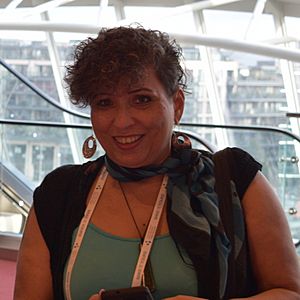Camille Callison facts for kids
Quick facts for kids
Camille Callison
|
|
|---|---|

Callison in 2022
|
|
| Born | c. 1964 (age c. 61) |
| Nationality | Member of the Tsesk iye (Crow) Clan of the Tahltan Nation |
| Alma mater | University of British Columbia (MA) |
| Occupation | Librarian |
| Employer | University of the Fraser Valley |
| Known for | Indigenous cultural activist |
Camille Callison, born around 1964, is an Indigenous librarian, archivist, and cultural activist. She is a member of the Tsesk iye (Crow) Clan of the Tahltan Nation in British Columbia, Canada. She works as the University Librarian at the University of the Fraser Valley in Abbotsford.
Camille is a strong supporter of the rights of Indigenous peoples and their traditional knowledge. She helps libraries, archives, and museums work better with Indigenous communities. She is also a leader in groups that support Indigenous knowledge and languages, like the National Indigenous Knowledge and Language Alliance (NIKLA).
Contents
Education and Learning
Camille Callison studied at the University of British Columbia. She earned her Bachelor of Arts degree in Anthropology in 2003. In 2005, she completed her Master of Library and Information Science. Her master's degree focused on First Nations topics.
She was guided by Dr. Gene Joseph, who started the Xwi7xwa Library. Camille is also working on her PhD in anthropology at the University of Manitoba. Her research focuses on Indigenous knowledge.
Career Highlights
Before joining the University of the Fraser Valley, Camille Callison worked at the University of Manitoba from 2012 to 2021. She held several important roles there.
- She was the first Indigenous Services Librarian.
- She also worked as the Indigenous Strategies Librarian.
- She helped staff learn about Indigenous cultures through a training program.
- She started the Mazinbiige Indigenous Graphic Novels Collection. This collection is at the Elizabeth Defoe Library.
Supporting Truth and Reconciliation
Camille Callison played a key role in bringing the archives of the Truth and Reconciliation Commission of Canada to the University of Manitoba. This led to the creation of the National Centre for Truth and Reconciliation. This center helps preserve the history and experiences of residential school survivors.
In 2013, she worked on a project to update library terms. This group changed old, insensitive terms about Indigenous peoples. They replaced them with more respectful and accurate words.
Leadership Roles
Camille Callison has held many important leadership positions. She works with groups in Canada and around the world.
Current Leadership Roles
- She is a committee chair for IFLA (2021-2023). IFLA is a global organization for libraries.
- She serves on the board of directors for the Canadian Research Knowledge Network (CRKN).
- She is a co-lead for the National Indigenous Knowledge and Language Alliance (NIKLA). This group works to protect Indigenous knowledge and languages.
- She helps lead a project with IEEE about Indigenous peoples' data.
- She is a founding co-chair of the University of Manitoba Anthropology Department Repatriation Committee. This committee helps return cultural items to Indigenous communities.
Past Leadership Roles
In 2015, Camille helped start the Canadian Federation of Library Associations (CFLA-FCAB). This organization replaced the Canadian Library Association.
- She was the Indigenous Representative to the Board from 2015 to 2019.
- She also served as vice-chair of the Board.
- She worked on a statement about Indigenous Knowledge and copyright.
- She spoke to the Canadian government about the Copyright Act.
Camille was also the Chair of the CFLA-FCAB Truth and Reconciliation Committee in 2017. She helped create the 'Truth and Reconciliation Report and Recommendations'. She then became the founding Chair of the Indigenous Matters Committee. She helped lead projects like the partnership with the 'Indigenous Canada' online course from the University of Alberta.
Her other past roles include:
- President of the Manitoba Library Association (2013-2015).
- Chair of the Indigenous Matters Section of IFLA (2017-2021).
Public Speaking and Outreach
Camille Callison often shares her knowledge with others. She helps people from different generations and cultures learn from each other. She has been a main speaker at many events, including:
- The OLA Super Conference in 2021.
- The 2020 American Indian Library Association President’s Program.
- The 2019 Association of Tribal Archives, Libraries, and Museums conference.
She has also been a guest on podcasts and helped edit special issues of journals. In 2019, she was a Library Leader in Residence at the University of British Columbia Okanagan.
Publications
Camille Callison has written many articles and contributed to books. Her works often focus on Indigenous knowledge, libraries, and reconciliation.
- Callison, Camille and Ford, Lyle. 2022. An Introductory Indigenous Cultural Competency Training Program in the Academic Environment.
- Steering Committee on Canada's Archives. 2022. Reconciliation Framework: The Response to the Report of the Truth and Reconciliation Commission Taskforce.
- Callison, Camille; Ludbrook, Ann; Owen, Victoria; and Nayyer, Kim. 2021. “Engaging Respectfully With Indigenous Knowledges: Copyright, Customary Law, and Cultural Memory Institutions in Canada”.
- Daigneault, Taylor; Mazowita, Amy; Rifkind, Candida; Callison, Camille. 2019. “Indigenous Comics and Graphic Novels: An Annotated Bibliography”.
- Callison, Camille; Rifkind, Candida; Sinclair, Niigaan James; Ballantyne, Sonya, Odijick, Jay; Daigneault, Taylor; Mazowita, Amy. 2019. “Introduction: Indigenous Comics and Graphic Novels: An Annotated Bibliography”.
- Callison, Camille. 2018. “A Brief History and Update from the CFLA-FCAB on Indigenous Matters”.
- Callison, Camille. 2017. Truth and Reconciliation Report and Recommendations.
- Callison, Camille; Roy, Loriene; and LeCheminant, Gretchen Alice (eds.). 2016. Indigenous Notions of Ownership and Libraries, Archives and Museums.
- Lougheed, Brett; Moran, Ry; Callison, Camille. 2015. “Reconciliation through Description: Using Metadata to Realize the Vision of the National Research Center for Truth and Reconciliation”.
- Callison, Camille. 2014. “Indigenous People’s New Canoe”.

